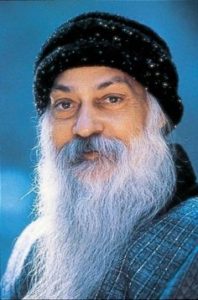“I want my people to know themselves, not to be according to someone else. And the way is in.”
Born in Kuchwada, Madhya Pradesh, India on December 11, 1931, Osho says of his parents, “I had chosen this couple for their love, their intimacy, their almost one-ness.” Growing in an atmosphere of tremendous love, freedom and respect, Osho was an intuitive and adventurous child with the knack of penetrating to the very heart of a situation. Exploring life fearlessly and intensely, he insisted on experiencing life for himself rather than acquiring beliefs or knowledge given by others. “My childhood was certainly golden – not a symbol, absolutely golden; not poetically but literally, factually… Those years were unforgettable.”
When he was seven years old, his maternal grandfather died with his head in Osho’s lap as they traveled in the back of a bullock cart on the long journey to reach the nearest doctor. This had a profound effect on his inner life, provoking in him a determination to discover that which is deathless. “I learned much in that moment of his silence…,” Osho said later. “I started on a new search, a new pilgrimage.” This, and other stories in Glimpses of a Golden Childhood, give rich insight into Osho’s early years, and the innocent spirit of the flame of rebellion and playfulness he brought to every endeavor in his life.
At the age of twenty-one, Osho became enlightened. “For many lives I had been working on myself, struggling, doing whatsoever can be done – and nothing was happening. The very effort was a barrier… Not that one can reach without seeking. Seeking is needed, but then comes a point when seeking has to be dropped… And that day the search stopped…it started happening. A new energy arose… It was coming from nowhere and everywhere. It was in the trees and in the rocks and the sky and the sun and the air – and I was thinking it was very far away. And it was so near…”
After his enlightenment on March 21, 1953, Osho graduated from the University of Saugar with first class honors in philosophy. While a student, he won the All-India Debating Championship. He was a professor of philosophy at the University of Jabalpur for nine years.
Meanwhile, he traveled throughout India giving talks, challenging religious leaders in public debate and meeting people from all walks of life. He read extensively, everything he could find to broaden his understanding of the belief systems and psychology of contemporary man.
Osho had now begun to develop his unique Dynamic Meditation techniques. Modern man, he said, was so burdened with the outmoded traditions of the past and the anxieties of modern-day living that he must go through a deep cleansing process before he could hope to discover the thought-less, relaxed state of meditation. He began to hold meditation camps around India, giving talks to the participants and personally conducting sessions of the meditations he had developed.
For more than thirty-five years Osho worked directly with people who came to him, sharing his vision of a “New Man” and inspiring them to experiment with a life based in meditation. Bridging the ancient truths of simpler times with the current reality of man, he created numerous meditation techniques, which give seekers an avenue to experience the ultimate. Seeing that the complexities of life needed to be addressed, he worked closely with many prominent therapists from the West to create new therapies based in meditation.
He changed his name from Bhagwan Rajneesh to Osho and explained that the word ‘Osho’ is derived from William James’ expression ‘oceanic experience’ which means dissolving into the ocean. “Oceanic describes the experience,” says Osho, “but what about the experiencer? For that we use the word ‘Osho’.”
Osho left his body on January 19, 1990. Just a few weeks before that time, he was asked what would happen to his work when he was gone. He said:
“My trust in existence is absolute. If there is any truth in what I am saying, it will survive… The people who remain interested in my work will be simply carrying the torch, but not imposing anything on anyone…
I will remain a source of inspiration to my people… I want them to grow on their own – qualities like love, around which no church can be created, like awareness, which is nobody’s monopoly; like celebration, rejoicing, and remaining fresh, childlike eyes…”

